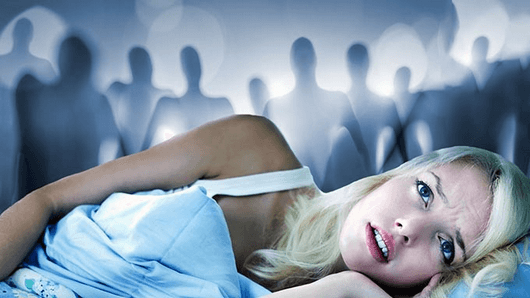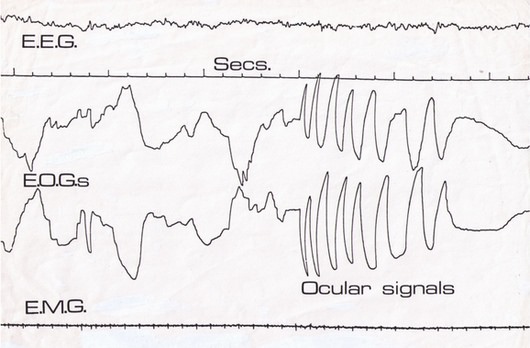5 Myths About Lucid Dreaming
All too often, movies and books turn lucid dreaming into hellish personal nightmares. This is not at all representative of my adventures in lucidity.
Let's face it, there are some pretty crazy myths about lucid dreaming.
That's partly because it's a strange concept to grasp if you have never had a lucid dream before. I've seen plenty of people spread misinformation and half-truths around the internet without even realizing what they're really saying.
And it's partly because famous books and movies about lucid dreaming tend to twist the truth to make their plot more dramatic. Sure, I appreciate poetic licence. But it's a devil of a job to set the record straight when thousands of newcomers to the world of lucid dreaming have all these myths in mind.

Lucid Dreaming Myths in Movies
All too often, fictional movie story lines turn the notion of waking up in dreamland into hellish personal nightmares.
The dreamer becomes crippled, trapped in their own unconscious, and plagued by sinister figures out to harm them.
This is not at all representative of my adventures in lucidity. Most of my lucid dreams are surreal, euphoric, awe-inspiring works of inner creativity. When I realize I'm dreaming, it's the best. No bogeymen here, thanks.
MYTH #1. You can get stuck in lucid dream limbo.
Of course I love the movie Inception, but its unfortunate legacy is the myth of dream limbo: the idea that you can become stuck in a deserted lucid dream land for what literally feels like decades.
I've been doing this gig for 17 years, and I've never become stuck in a lucid dream limbo land of any sort.
If I want to wake up, I simply squeeze my eyes tightly shut then open them again while shouting "WAKE UP!" When I first started lucid dreaming, this worked like a charm to help me escape from nightmares. I rarely use it nowadays, even during nightmares, because I prefer to confront the nightmare figure if at all possible and reconcile the underlying issue.
I have been stuck in non-lucid nightmares. I'm sure everyone can relate to this. But let me explain the difference: in a non-lucid (non-conscious) dream or nightmare, you don't know you're dreaming. Therefore, you have no capacity of knowledge to wake yourself up. In short, if dream limbo did exist, lucid dreaming would be the only way to escape!
By contrast, in lucid dreams, you have every awareness that you are dreaming, you have control of your dream body and, to some degree, control of your sleeping body in bed. You can cause your real eyes to open and your real breathing to speed up just by elaborating these actions in your dream.
FACT: You can't get stuck in lucid dream limbo.
RELATED: The Mythology of Inception
MYTH #2: If you die in a lucid dream, you die in real life.
In Wes Craven's classic horror flick, A Nightmare on Elm Street, a pedophile named Freddie Krueger haunts the dreams of teenagers. Worse, when he attacks them in their dreams... they die in real life.
If such a myth were true, I wouldn't be here to write this.
I've died many times in lucid and non-lucid dreams. The other night I was stabbed to death in the stomach and passed through this wonderful red-black dream realm in which I felt totally free before emerging into the first-person perspective of my son. I got to exist as a two-year-old for the rest of the dream!
Some people say they simply wake up when they die in a dream, and that's usually because they've been murdered or have died in some adrenaline-surging dream scenario. As a lucid dreamer I have trained myself to remain calm in my dreams whenever I have the conscious clarity to do so. And that means if someone kills me, I tend to become instantly lucid and hold on to the dream thread.
Typically, I'll pass through some sort of multi-colored portal or realm and emerge as another being. After dying, I have woken up as an alien on a surgical table, with the recollection that my human life was just a long dream as part of an epic alien lifecycle. I have woken up as other human beings. And I have woken up as myself in a different time (like a flashback) or however else my unconscious wants me to perceive this dream plot twist.
I say "woken up" because, for me, the transition between dying and being reborn in a lucid dream is usually a sense of going from dark to light. I suspect this is reflected by my unconscious cultural interpretation about what happens when you die. I don't believe in the afterlife, but the movies tell me so. Also, consider the dark-to-light nature of the hypnagogic state that pervades the inter-dream borderland state.

FACT: You will always wake up from a dream about dying (eventually).
MYTH #3. Lucid dreaming is a New Age fad.
The charming and innocent movie, The Good Night, tackles lucid dreaming head-on... only to represent the oneironaut community as hairy hippies, holding hands and crying on each other's shoulders for emotional support.
I personally can't relate to this stereotype - and as a lucid dreamer or would-be dreamer, I suspect, neither can you.
Unfortunately, this myth that lucid dreaming is an unscientific, wholly spiritual pursuit still persists in the general population.
On explaining what I do for a living, a friend once said to me: "Lucid dreaming? Do you really believe in all that?"
I was taken aback by this response because I've long known that lucid dreaming is scientifically proven. As a scientist and a skeptic, this is bitterly disappointing.
So let's bust this myth into pieces.
Lucid dreaming is not New Age (a concept defined as a religious or spiritual movement).
Lucid dreaming is a measurable state of consciousness, having been scientifically studied for the past four decades. It has emerging applications in clinical psychology today.
Indeed, though it has been documented throughout history for thousands of years, laboratory evidence for lucidity was first generated in 1975. Dr Keith Hearne (interviewed here) measured the precise and predefined eye movements of his lucid dreaming experimental subject, Alan Wolsley.
This experiment was more famously replicated in 1983 by Dr Stephen LaBerge, and more recent studies have analyzed the brainwave frequencies of lucid dreamers, finding that they peak in the Gamma range (32-100 Hz) compared to regular dreaming which occurs in the Theta (4-7 Hz) range.
Whatever you believe about New Age philosophies, it's inaccurate to label lucid dreaming as such, and the implications of that are profound.
RELATED: The Science of Lucid Dreaming

FACT: The first proof of lucid dreaming was produced in 1975.
Lucid Dreaming Myths on The Internet
It's not just Hollywood that's responsible for producing myths about lucid dreaming. The internet is home to an abundance of myths and misinformation.
I've found these following myths on the blogs and forum posts of inexperienced dreamers, as well as in the hype of internet marketing letters which try to spin lucid dreaming for profit.
The problem here is a lack of critical thinking. Next time someone makes an outrageous claim about lucid dreaming, just how willing are they to adequately explain the conditions? Or are they just trying to sound clever, mysterious, or simply make a quick buck from your curiosity?
MYTH #4. If you don't lucid dream, you're wasting one-third of your life.
If you sleep for an average of 8 hours per day, then it's true to say that you're asleep for one-third of your lifetime.
However, let's not confuse sleep with dreams. It's simply not possible to lucid dream constantly for 8 hours per night.
Each night, you pass through four stages of sleep, of which around 100 minutes total consist of Rapid Eye Movement (REM) sleep.
So at best, you could potentially lucid dream for up to two hours, in separate stints, but this really is the upper limit. Most experienced lucid dreamers would consider it a success to achieve 20-30 minutes of lucid dreaming on a given night. That's because lucid dreams are so very awesome; half an hour of that is still breathtaking stuff.
What's more, the internet marketers that create this kind of spin are overlooking the fact that sleep is essential to your survival. You aren't, by any stretch of the imagination, "wasting" a third of your life or missing out on a Second Life in your sleep.
Sure, without lucidity you are missing out on a lot of fun. But don't fall victim to the myth that you could be spending one-third of your life in lucid dreams. It's just not physically possible.
FACT: Lucid dreams may offer a kind of Second Life, but not in the sense of wasting an entire night's sleep.
MYTH #5. Only advanced yogis can have lucid dreams.
While meditation is proven to prime your brain for lucidity, you don't need to be an Eastern yogi to attain this mental state.
I learned how to meditate when I got into lucid dreaming, because the two go hand-in-hand. Meditating simply means focusing your attention on your own train of consciousness (without your internal dialogue running).
This serves to heighten your self awareness while awake, and has a knock-on effect while you're dreaming too. It becomes much easier to have that "Aha!" moment when you're dreaming... and become lucid.
Of course, many children can lucid dream naturally and they are unlikely to be meditators. But they do tend to daydream more and visualize dreams as they go to sleep, which is how they master the art. So it's a very valuable skill to have; to simply meditate and visualize as you go to sleep.
Experts agree that everyone has the ability to lucid dream. You already dream. And you already access consciousness every waking day. Lucid dreaming is a case of combining these two mental states, which really isn't that difficult once you make it a regular mental habit.
Don't believe the myth that lucid dreaming belongs to an elite club of people with special mental skills who are dedicated to years of training. It simply isn't true. Lucid dreamers come from all walks of life, among a range of age groups, and they have a range of IQs.

FACT: With commitment, anyone can learn how to lucid dream.
Final Thoughts
It's my mission to bust the myths of lucid dreaming so that it becomes more accessible to more people. I want to teach the world to lucid dream.
That's much more likely to happen if we don't perpetuate the mistaken beliefs that our dreams are out to get us, to trap us and harm us, or that the practice of lucidity is a mysterious spiritual fad or will simply land us in limbo.


















